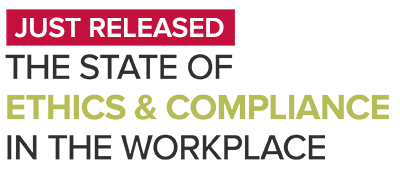
State of Ethics in Large Companies
A Research Report from the National Business Ethics Survey® (NBES®)
Large companies can dramatically improve their integrity by implementing effective ethics and compliance programs to reduce employee misconduct and improve every key measure of workplace behavior. On average, large companies (90,000 or more employees) with effective programs face half of the rules violations as those without effective programs. Their employees experience less retaliation for blowing the whistle on rule-breaking and feel less pressure to compromise standards.
Drawing on data from ECI’s most recent National Business Ethics Survey®, the study also credits effective programs and strong ethics cultures for making it more likely that employees will report wrongdoing when they see it. Nearly nine of ten employees (87 percent) who observe violations at large companies with effective programs report those violations for action by higher ups, compared to just 32 percent who report wrongdoing when programs are lacking. That’s significant because reporting is essential for identifying and eliminating potential ethics risks.
“Companies that invest in ethics reap an enormous return,” ECI CEO Patricia Harned said. “Better workplace ethics cuts business risks by reducing the chance that serious ethics problems will throw companies off course and distract them from their core business.”
Executive Summary
When the largest companies (those with 90,000 or more employees) invest resources in ethics and compliance, they get impressive results. The strength of an organization’s ethics culture and the effectiveness of its internal ethics and compliance (E&C) program are closely tied to workplace behavior. Each key indicator of ethical performance – pressure to compromise ethics standards, observation of misconduct, reporting of violations, and retaliation for reporting – improves in large companies with strong ethics cultures. Ethical performance is strengthened in organizations with effective E&C programs. In fact pressure and retaliation become extremely rare in the largest companies when they implement effective ethics programs.
Pressure to violate standards and misconduct decline substantially; workers are far more likely to report the misconduct they see; and they are far less likely to face retribution for reporting when companies have effective E&C programs. Only one-third (33 percent) of workers observed misconduct in large companies with effective ethics programs, compared to a misconduct rate of almost 51 percent among all large companies and more than 62 percent for large companies that do not have effective E&C programs. Pressure and retaliation fall to extreme lows (3 percent and 4 percent, respectively) in big companies that have established effective E&C programs.

ECI members get access to this entire report at no charge. The full report is available to members of the public for a contribution of $35.
